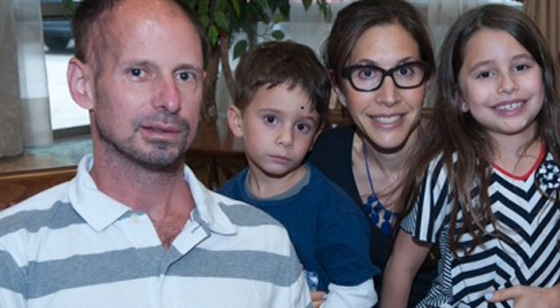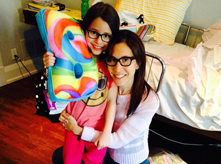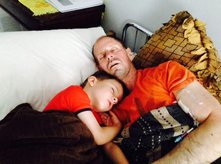
Matthew, Zachary, Heidi and Brooke at Brooke's birthday party on June 13.
(Photo credit: Paula Feig)
Heidi Wilk, Toronto Rehab dietitian, was on a much-needed vacation in San Diego with her three children and husband, Matthew Morton, when his terminal brain cancer began to worsen.
Heidi managed to get everyone on the plane back to Toronto and rushed Matthew to the Mount Sinai Hospital Emergency Department. Matthew, 39, had been living with brain cancer since he was 32.
The Mount Sinai team explained he was now in the end stages of the cancer.
They needed to talk about palliative care.
"How Matthew has dealt with his terminal illness is amazing," reflects Heidi.
Related to this story:
Heidi's new role as caregiver
Heidi and Matthew previously discussed he would receive palliative care at home.
"Matthew wanted to go home," explains Heidi. "He wanted to be with the kids for the rest of his time. I wanted the same."
Heidi has been on leave from work since the end of May so she can be Matthew's primary caregiver.
"The first two weeks of homecare were chaotic" says Heidi.
By the time Heidi arrived home from the hospital, the living room furniture was gone and the space had been converted to a hospital room.
"I'm now part-time dietitian and part-time nurse," says Heidi. "I don't know how people without a health-care background do this."

Heidi and Brooke at home a week before Brooke’s 8th birthday. (Photo: Heidi Wilk)
One of the bigger challenges for Heidi was learning from the nurse how to administer medication and flush his peripherally inserted central catheter (PICC line).
The support of in-home professionals has made it more manageable.
A personal support worker comes to the house for three hours each day to provide a reprieve for Heidi. This allows Heidi to get outside for a walk, do errands, check her computer – it gives her personal time.
Heidi spends most of her day in the living room with Matthew. She stays with him until he falls asleep at night. She often wakes up during the night just to check on him to make sure he's okay.
The impact of Matthew's illness on him
"Matthew gets overwhelmed with a lot of people around – with his brain tumour he is slower at processing multiple things at once and sideways movements of his head can make him nauseous," Heidi explains. "When it's one-on-one and quiet, he can focus."
Since coming home, she has noticed some of the changes in Matthew have been more drastic than others.
"In a week I saw a big difference in terms of his orientation to time and place," Heidi says. "Sometimes he thinks lunch is dinner. And, most mornings he wakes up ready to go to work asking for his wallet, phone and briefcase.
"It's hard. I'm able to redirect him, but he can get frustrated."
Heidi and Matthew still have good conversations when he is able to - mostly about the kids.
And, while in the hospital, they had to have tough discussions about their end-of-life plans.
Helping her kids cope with the new normal

Zachary with Matthew in their living room that’s been converted into a hospital room. (Photo: Heidi Wilk)
Heidi and Matthew's children: Brooke, 8, Zachary, 4, and Josh, 2, are processing his sickness differently.
"Josh is too young to understand what is happening," says Heidi.
"Zachary has a sense something is different. I explain to him that Daddy can't play with him as much as before because he is sick with cancer. I don't want him to feel like Daddy purposely doesn't want to play with him."
"Brooke understands the most. She knows Daddy has cancer and she knows people die from cancer. She keeps asking if Daddy is going to die.
"The other day she said, 'I don't understand – a few days ago he had me on his shoulders, now this.' I feel so sad for my daughter but I hope with all the love and support she will be ok."
Heidi has brought in a children's bereavement specialist who is doing play therapy with Brooke and it is helping. She's managing at school and she's slowly getting more comfortable being around Matthew.
The UHN end-of-life dialogue
UHN has begun a series of five end-of-life symposiums to facilitate dialogue from different perspectives about the struggles when it comes to end-of-life discussions and care.
There have been two symposiums to date with the third on June 23. At each, more than 100 people have attended—with a significant representation from clinicians across the organization.
"Our meetings have kept the dialogue going," says Joy Richards, co-lead and Vice President, Health Professions and Chief Nursing Executive. "It gives our organization an understanding of what the challenges are from different perspectives. It's become a safe place to share vulnerable comments and grow from there. It is also a place where UHN's current expertise in this area can be showcased and leveraged."
The goal of these sessions will be to create guiding principles of how we approach end-of-life care. These will be shared and discussed with all of UHN.
If you are interested in attending the next session on June 23 at 1 p.m., please RSVP to
peggy.wood@uhn.ca.
Heidi explains that Matthew finds it hard when the kids are in high-energy mode around him because of the noise and activity. Heidi has worked with their bereavement counsellor to ensure the kids understand that it's because of the cancer their Daddy feels this way and it is nothing that they've done.
How this experience has shaped Heidi
"I've discovered a lot about myself. It's so overwhelming at first. I thought – I can't do this. Once I realized it is okay to ask for help, a huge weight was lifted off my shoulders. Friends send over groceries and arrange play dates and lifts for my kids. The kindness of others is immeasurable and something I will never forget."
Heidi also impressed herself with how she's learned new skills in order to care for Matthew.
"I never thought of myself as a strong person. This experience has shown me I am stronger than I ever thought possible.
"I've also accepted that I might not be able to get everything done in a day. I focus on accomplishing one thing at a time to ensure the rest of the day is spent with Matthew. This is what's important right now."
Through her experience of being on the patient and caregiver side of health care, Heidi now has an even greater understanding of the importance of empathy and compassion.
"The best thing is for physicians and other health-care professionals to feel for your situation," says Heidi. "You want them to see you as a person. To listen to your questions and take the time to answer.
"This has made a world of a difference."
